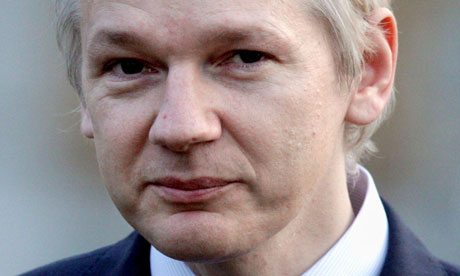
The news that Andrew O'Hagan has signed on to ghost the book for which Julian Assange has already been paid more than $1m is a piquant reminder that while everyone has a book in them, not everyone can get it out.
The revelations of WikiLeaks run to an estimated 300m words, but it seems that its founder either cannot or will not manage the modest 70–80,000 words about himself that his publishers have requested.
Assange is not the first. More than is generally realised, the bestselling titles of our time have a troubled (shall we say complicated?) relationship with the names whose authorship they advertise. Keith Richards's Life was written by James Fox. Katie Price (aka Jordan) relied on Rebecca Farnworth to launch her career as a novelist with Angel. Further down the food chain, even that infuriating meerkat from the comparethemarket.com adverts has had A Simples Life put together by Val Hudson, formerly of Headline.
The top category of ghosted titles, now a declining market, remains the misery memoir, books such as Tell me Why, Mummy or Please, Daddy, No, or Sharon Osbourne's Extreme: My Autobiography.
During the past 10 years, this genre has been a huge money-spinner, accounting for almost 10% of the UK book market, closely followed by run-of-the-mill celebrity autobiographies (Russell Brand's My Booky Wook), true crime memoirs (Dave Courtney's Stop the Ride, I Want to Get Off), sporting lives (Wayne Rooney's My Story So Far) and tales of derring-do (Bruce Parry, Bear Grylls, et al). As some publishers have discovered, it's not always a licence to print money. Bill Oddie's One Flew Into the Cuckoo's Egg sold just 4,811 copies.
The ghost's world may be one of jeopardy, but it's probably less perilous than it is depicted in Robert Harris's thriller The Ghost. First, there's the inevitable tussle over money. Traditionally, the ghost receives 33% of the advance (plus royalties). In recession, this has been squeezed to as little as 10%, a figure the better class of ghost will disdain.
Often, battles over the money pale into insignificance next to the titanic clash of egos involved in taking on another's voice and character. The ghosts I've spoken to tell me that the subject they approach with utter dread is the fragile personality with pretensions to authorship.
Who is not vulnerable to the tug of amour-propre? The ghost, who starts out as a hybrid of therapist, muse and friend, enters a psychological minefield. The ghost should, I'm advised, never forget that, at the end of the day, he or she ranks somewhere between a valet and a cleaner. Jennie Erdal's Ghosting is an entertaining and often moving account of life in this literary skeleton cupboard.
In France, ghosts are known as nègres, and there is a kind of slavery implicit in this transaction. It's worth remembering, however, that much of literary life is shaped by writers in disguise. Ruth Rendell writes as Barbara Vine. Sebastian Faulks has pretended to be Ian Fleming. Doris Lessing tried to publish as Jane Somers. Even Joanne Rowling adopted the androgynous JK.
A new novel, O, about President Obama has recently appeared under the coy authorship of "Anonymous", who turns out to be the American speechwriter and Senator John McCain's ghostwriter, Mark Salter. In the sad compromise between the airy realm of the imagination and the grim reality of the printed page everything gets a little bit botched.
Still, there's the magic of authorship. Andrew O'Hagan, a novelist as well as a journalist, will appreciate the nuances here. The quest for originality takes people in unpredictable ways. I recall, some years ago, a female pop star attending a book trade prize-giving for which her ghosted bestselling memoir had been shortlisted. When she duly won, she left her ghost at the table and graciously collected her prize, all smiles, modesty and gratitude, the model author.
When the prizewinner returned to her publisher's table, the woman who had actually written the book reached out, instinctively, to touch the trophy. Bad move. The star snatched it back, clouting her ghost across the cheek to remind her who was boss. When you pay the piper, you call the tune.
Edinburgh ends up on the horn of a dilemma
As Portsmouth battles with its statue of Dickens, the Bishop of Edinburgh, Brian Smith, has stepped into the minefield of contemporary culture. He proposes installing a rhino (the logo of the shop) on the site of the Paperback bookshop, opened on Charles Street in 1959 by a recently demobbed US soldier called Jim Haynes. The bishop says that Haynes, who went on to launch the Art Lab in 1970, deserves to be commemorated as the cultural impresario from whom the ideas and impetus for the Edinburgh International Book festival and Traverse Theatre emerged. Haynes, now living in Paris, is wary of this belated Scottish acclaim. He says: "Like Tom Paine, I am a world citizen. My roots cover the earth." According to his sensational autobiography, Thanks for Coming, his roots used to have rather less global ambitions, but that's another story.
Márquez author signed up for rival's biography
I am intrigued to hear that Bloomsbury has just signed up a new biography of longstanding Faber author and Nobel laureate Mario Vargas Llosa, the author of Aunt Julia and the Scriptwriter and The War of the End of the World. This life of a "Boom" generation novelist and contemporary of Julio Cortázar and Carlos Fuentes will be written by Gerald Martin, who has already published a life of Llosa's rival Gabriel García Márquez. Martin tactfully says that Llosa "is as controversial in politics as he is in literary creation, but at least as compelling". I hope this means that Martin will explore the full story of the novelist's tilt at the presidency of Peru and the astonishing way in which the prize was snatched from his grasp by the now discredited figure of university agronomist Alberto Fujimori.

